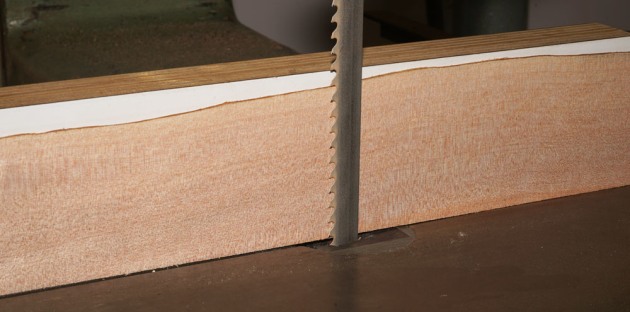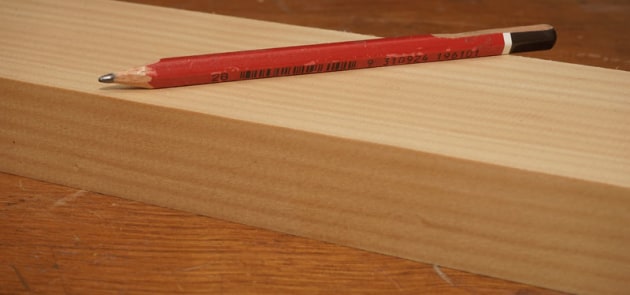Wikus 19mm bandsaw blade
Above: Showing the Wikus blade and the surface it left on satin silkwood.
Review: Richard Vaughan
Like most woodworkers I make regular use of my bandsaw, a hefty 70 year old Australian made Barker. I switched to carbide tipped blades long ago because many Australian timbers are merciless on anything else, and ply, MDF and particleboard kill carbon steel in no time.
Whatever the tool you are using to cut wood it simply has to be sharp. Chisels, gouges and plane blades are often acknowledged but persevering with dull edges on powered tools is a far too common cause of frustration and poor work. A blunt bandsaw blade will wander off track and burn the wood resulting in disappointment and exasperation when you are supposed to be enjoying yourself. A durable edge is a very good thing.
As well as cutting shaped work – I do like curves – and various jigs as required, I regularly use the bandsaw for cutting facings (thicker veneers suitable for horizontal surfaces) and laminates. I also tend to use the bandsaw for ripping timber for a better yield because the kerf is at least half that of the tablesaw ripping blade, and the finish it leaves is quicker to clean up. Making best use of nice wood for boxes is another benefit.
One downside of TCT bands is that unless you are prepared to dedicate a big chunk of time with a Dremel or similar and diamond grinder, you may have issues with resharpening because the automated process of sharpening companies tends to reduce the clearance of the tiny carbide tip so the saw will wander and probably burn, and probably be rendered useless. But TCT blades last so long that’s really not such a big issue.
The first test cut on a piece of hoop pine confirmed the choice.
Up until recently the various makes of 12.7mm/half inch carbide tipped bands at 3 or 4tpi did the job satisfactorily, and stayed on my bandsaw for all work. But I really had to watch the feed speed to prevent the narrow blade being deflected off-line when ripping boards at 200mm or more deep.
Wikus is a German company specialising in saws. I purchased their 3tpi 19mm carbide tipped band through Brisbane company CSK (Combined Saw and Knife). It is 4820mm long. The width keeps it tracking straight and the gullets are deep enough to clear even soft woods. The first test cut on a piece of hoop pine confirmed the choice. I ran some wider and harder timber through it
and was well pleased with the result, which was important as I had some spectacular and pricey boards of satin silkwood I needed to resaw and had no room for wandering. It may well have paid for itself in that job.
The kerf is an economical 1.6mm and the finish off the blade is excellent. I’ll continue to use the half inch TCT bands for general work, or 3/8 inch for tighter curves, but will be changing over to the Wikus for resawing wider boards, as well as for cutting laminates and veneers.
Presumably not many of you now have tablesaw blades without tungsten carbide tipped teeth. Hopefully those who don’t have one will now consider TCT bandsaw bands.
This blade was $322 at time of writing (June 2020). The extra cost of TCT blades seems to daunt some people but the life of the blade and the results more than justify that outlay in my books. I recommend having this Wikus band available for probably a year or more of remarkably accurate use. Bi-metal blades are a cheaper option but in my experience not nearly as durable.
Available from www.combinedsaw.com.au
Richard Vaughan is a furniture designer maker in Brisbane who also teaches woodworking, see richardvaughan.com.au




